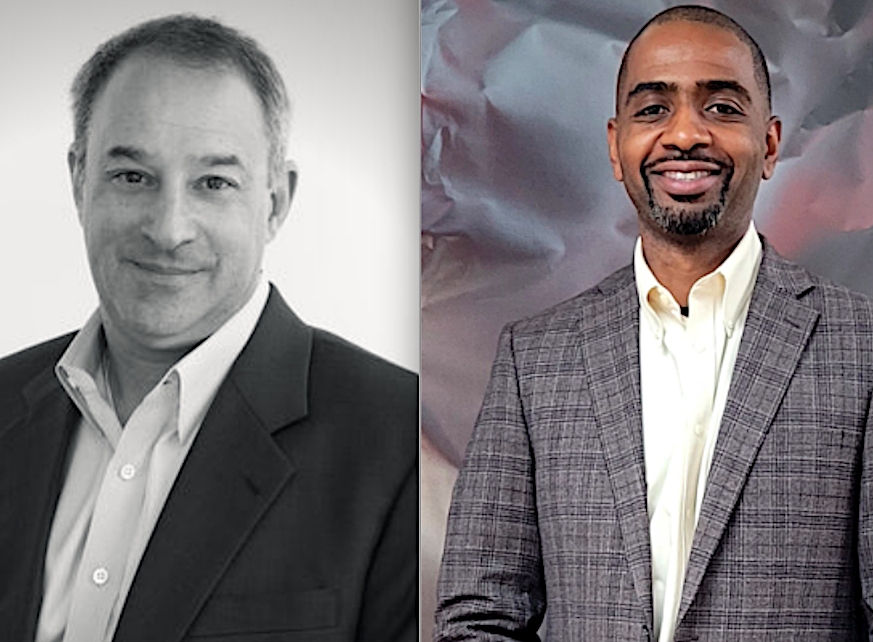Urban Technologies recycles electronics for large enterprise clients. But its unique approach benefits everyone.
* * *
We’ve all heard of win-win scenarios. But how about win-win-win?
Thanks to its innovative business model, Urban Technologies — an electronics recycling company that recently joined SI’s Pittsburgh chapter — simultaneously does three things at once: It creates unique opportunities for its clients. It provides game-changing support for nonprofits that serve the community. And it generates profit for itself. The company’s approach is a prime example of what the Satell Institute stands for and what CSR is all about — free enterprise that does well and does good.
“The way we go about doing our business is that we create very successful public-private partnerships,” says Steven Kaufman, Urban Technologies’ CEO (pictured above, left). “For public-private partnerships to work well, everyone needs to win. And with us, they do.” He adds that Corporate Social Responsibility “is the cornerstone of who we are as a company, of how we think about everything we do.”
An Innovative Model
Urban Technologies, which is headquartered in Florida and operates in several East Coast cities (including Pittsburgh and Philadelphia), specializes in what’s known as end-of-life IT and secure data destruction, focusing on large enterprise clients. When companies need to get rid of aging tech or medical equipment, they call Urban, which offers best-in-class service that fully protects user data and the environment.
But it’s Urban’s unique model that really makes it stand apart. The company takes that retired electronics equipment and recycles or restores it, earmarking a portion of it (often laptops or desktop computers) for nonprofit organizations. The rest it resells, keeping some of that revenue as profit while giving the remainder to its corporate clients as a cash credit. Many of those clients, in turn, donate that money to nonprofit organizations of their choice.
As an example, Kaufman offers a large regional insurance provider, which, after working with Urban Technologies last year, ended up with a cash credit of $40,000. The insurer took $20,000 of its credit and donated it to the Boys and Girls Clubs of Northeast Florida to support construction of a new STEM lab. It gave another $10,000 to Big Brothers Big Sisters of Greater Pittsburgh (where it also has a presence).
The result: Two nonprofits got invaluable corporate support. A corporation got a tax deduction and the reputational benefit that comes from giving back. And Urban Technologies earned a profit that allowed it to continue growing. Win. Win. Win.
Kaufman says that CEOs in particular seem to grasp — and appreciate — Urban’s model, since it allows their companies to manage a necessary task (responsibly getting rid of old electronics) while giving back to the community. “When we talk to people in the C-suite, they get it,” he says. “They say, wait, I can get computers to kids, and I can fund a STEM lab, and it really doesn’t cost me anything?”
Origins and Impact
Urban Technologies was founded in 2010 by a Navy veteran named Juan Carlos Villatoro, who wanted to create a more community-oriented, environmentally sustainable option for electronics recycling. Kaufman and his business partner Robert Schiller got involved several years later, with Kaufman becoming CEO and Schiller non-executive board chair. At Villatoro’s urging, Urban applied to become — and was certified as — a public benefit corporation. “B corps,” as they’re known, meet high standards for social and environmental performance.
Kaufman says the designation has been important, not only in how the company operates, but also in how it’s perceived in the market. “These days, with all the greenwashing that goes on, with all the marketing rhetoric around ‘doing good,’ it’s important to have the things you do be validated by a third party,” he says. “It allows us to say, ‘Don’t just take our word for it.’”
What’s also not debatable is the impact that companies that practice CSR can have in the community. With Urban Technologies, that influence is most notable when it comes to closing the digital divide between people who have easy access to technology and those who don’t.
Urban’s director of business development, Byron Simmons (pictured above, right), recalls that in the early days of the pandemic, mentors working with the nonprofit Big Brothers and Big Sisters were shut off from normal in-person contact with their young mentees. And since many of those young people didn’t have computers, video conferences weren’t really an option. “We were able to put 300 laptops into students’ hands so they could meet with their mentors,” Simmons says. “There’s no way we can even measure the positive results that came out of that.”
The impact that comes from leveling the technological playing field goes beyond mentoring. Giving young people better access to computers is also a powerful economic driver.
“There are an overwhelming number of entry-level tech jobs available,” says Kaufman. “I’m not talking about someone graduating from Duke with a degree in computer engineering. I mean entry-level computer jobs that pay $50,000 or $60,000 or $70,000 a year. That can change a life. It can change generations.”
Joining the Satell Institute
Urban Technologies was introduced to the Satell Institute by Becky Flaherty, CEO of Big Brothers Big Sisters of Greater Pittsburgh (an SI Nonprofit Affiliate). On behalf of that regional insurer, Simmons had delivered the $10,000 donation to the organization. Flaherty was grateful and, in turn, had a suggestion for Simmons and Urban Technologies.
“Becky loved what we do, and she thought it would be great for us to be around like-minded people and organizations,” says Simmons. “She said, ‘Satell is where you guys need to be. This is the group of people who are doing what you’re doing.’”
Flaherty was 100 percent right about that. As an SI member, Urban Technologies now finds itself among 500-plus CEOs all working together for the greater good. There’s no telling how many more wins will come out of that.


